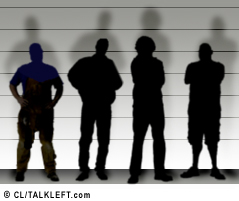Supreme Court to Re-Examine Eyewitness Evidence

It's about time. Adam Liptak of the New York Times reports the Supreme Court will revisit eyewitness identifications for the first time in 34 years. Mistaken eyewitness identification is the leading cause of wrongful convictions:
Of the first 250 DNA exonerations, 190 involved eyewitnesses who were wrong, as documented in “Convicting the Innocent,” a recent book by Brandon L. Garrett, a law professor at the University of Virginia.
Many of those witnesses were as certain as they were wrong. “There is absolutely no question in my mind,” said one. Another was “120 percent” sure. A third said, “That is one face I will never forget.” A fourth allowed for a glimmer of doubt: “This is the man, or it is his twin brother.”
[More....]
| < Desperate Last Moves by Lawyers for Dominique Strauss-Kahn's Accuser | Subsidizing Lousy Lobbyists > |



